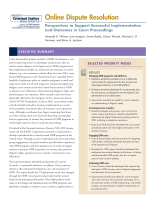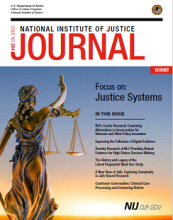Courts
Court Appearances in Criminal Proceedings Through Telepresence: Identifying Research and Practice Needs to Preserve Fairness While Leveraging New Technology
Prosecutor Priorities, Challenges, and Solutions
Online Dispute Resolution: Perspectives to Support Successful Implementation and Outcomes in Court Proceedings
Prosecuting Trafficking in Persons Cases: An Analysis of Local Strategies and Approaches, Executive Summary
Federal Criminal Case Processing Statistics (FCCPS) (Bureau of Justice Statistics)
The FCCPS data tool compiles comprehensive information provided by selected federal criminal justice agencies, ranging from arrest to reentry. Users can access data on suspects and defendants processed across stages of the federal criminal justice system from 1994.
National Judicial Reporting Program (Bureau of Justice Statistics)
From 1986 to 2006 the National Judicial Reporting Program (NJRP) collected felony sentencing from a nationally representative stratified sample of state courts in 300 counties. The information collected included: age, race and gender of persons convicted of an offense; dates of arrest, conviction and sentencing data; mode of conviction and type of sentence imposed. Data were collected every 2 years during this time period.
Civil Justice Survey of State Courts (Bureau of Justice Statistics)
The Civil Justice Survey of State Courts (CJSSC) provided a broad, systematic investigation of the nature of civil litigation (i.e., tort, contract, and real property cases) disposed of in a sample of state general jurisdiction courts. Data collected includes information about the types of civil cases litigated at trial, types of plaintiffs and defendants, trial winners, amount of total damages awarded, amount of punitive damages...
National Survey of Prosecutors (Bureau of Justice Statistics)
The data obtained from the National Survey of Prosecutors (NSP) provided data on prosecutorial activities nationwide as well as a variety of administrative and legal issues facing prosecutors who handle felony cases in state courts. The 2007 NSP data collection was a census, rather than a survey, and included 2,330 prosecutors' offices. Prior to the 2007 census, the most recent census of state prosecutors had...
Court Statistics Project (Bureau of Justice Statistics)
The Court Statistics Project (CSP) provides a systematic means to develop a valid, uniform, and complete statistical database that details the operation of state court systems. It provides high-quality, baseline information on state court structure, jurisdiction, reporting practices, and caseload volume and trends. Effective management and planning at the local, state, and national levels depend on accurate, consistent, and comparable information to assess the business...
Census of State Court Organization (Bureau of Justice Statistics)
This collection serves as the primary source for detailed information on the structure and framework of state courts.
State Court Processing Statistics (Bureau Justice Statistics)
Formerly National Pretrial Reporting Program (through 1994), SCPS provided data on the criminal justice processing of persons charged with felonies in 40 jurisdictions representative of the 75 largest counties. These counties accounted for nearly half of the serious crime nationwide. The program prospectively tracked felony defendants from charging by the prosecutor until disposition of their cases (a maximum of 12 months for nonmurder cases and...
National Survey of Indigent Defense Systems, 1999-2000 (Bureau of Justice Statistics)
Conducted during 1999-2000, this survey represented the first systematic study of indigent criminal defense services by BJS since the 1980s. The study collected indigent criminal defense data at the trial level for (1) the 100 most populous counties in the United States, (2) 197 counties outside of the 100 most populous counties, and (3) states that entirely funded criminal indigent defense services. Information obtained includes...
Census of Problem-Solving Courts (Bureau of Justice Statistics)
The 2012 Census of Problem-Solving Courts (CPSC) involved the collection of data from all active problem-solving courts. In order to be considered a problem-solving court, it must have (1) operated within the judiciary, (2) operated under the direction of a judicial officer, (3) been active in the reference year, and (4) used therapeutic services to reduce recidivism. A variety of data elements were collected in...
National Survey Of Indigent Defense Systems, 2013 (Bureau of Justice Statistics)
In 2013, the National Survey of Indigent Defense Systems (NSIDS) was designed as a census of all forms of indigent defense public defender, contract counsel, and assigned or appointed counsel in all fifty states and the District of Columbia. Indigent defense was characterized as state-administered (one or two central offices directing indigent defense for the entire state) or county-administered (each county provides and administers indigent...
NIJ's Courts Research: Examining Alternatives to Incarceration for Veterans and Other Policy Innovation
NIJ Journal Issue No. 284: Focus on Justice Systems
Promising Practices from the Court System's COVID-19 Response: Ensuring Access To Justice While Protecting Public Health
Can Jury Instructions Have an Impact on Trial Outcomes?
Guidelines for Post-Sentencing Risk Assessment
Fast and Portable Drug Testing: Dual-Method Prototype Shows Promise for Court-Admissible Drug Testing
Researchers integrate two independent, validated drug-testing techniques – mass spectrometry and Raman spectroscopy – onto a single platform prototype for fast and accurate analysis of seized substances.
Remote Testimony
Study Revealed Safe Harbor Laws Increased Protections for Sex-Trafficked Youth, Identified Needs for Agency Support and Judicial Training
A study of Kentucky’s safe harbor laws revealed they have helped decriminalize sex-trafficked youth. However, the study also highlighted a lack of resources and training for child welfare personnel and judges who work with these youth.







